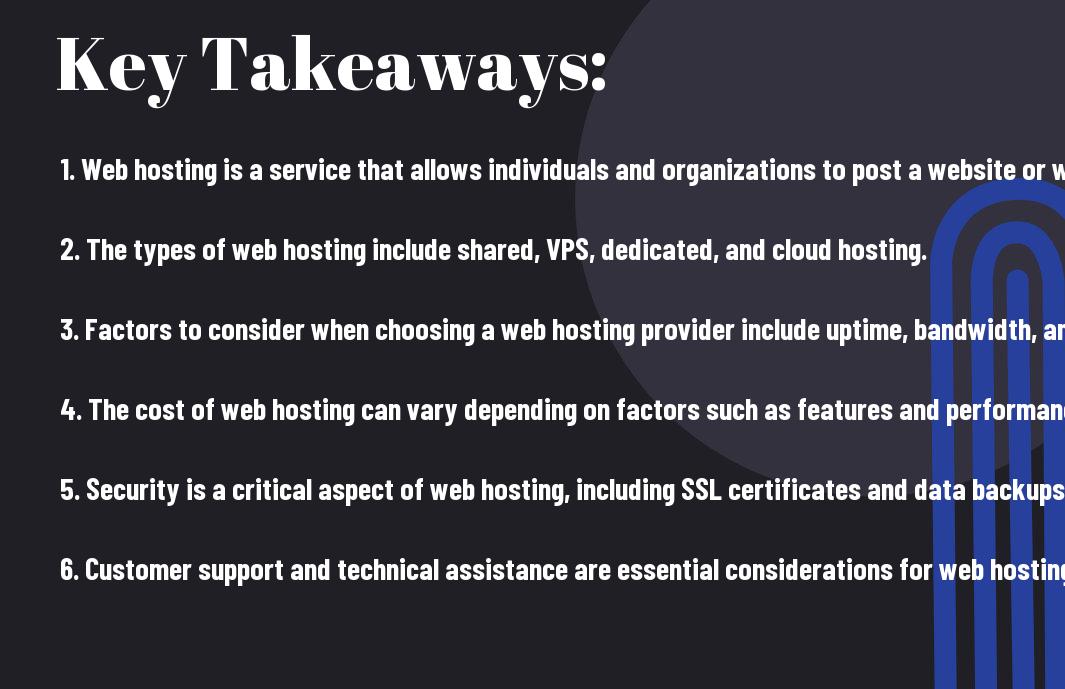Congratulations on taking your first step into the world of web hosting. Whether you are new to website ownership or looking to gain a deeper understanding, this guide will provide you with the essential knowledge you need to navigate through the complexities of web hosting. Choosing the right web hosting provider is crucial to the success and security of your website. From control panels to server types, and storage options, there are a plethora of technical terms and concepts to tackle. Fear not, as we break down the key components of web hosting in a clear and concise manner, empowering you to make informed decisions and enhance your online presence. Stay tuned as we help demystify the intricacies of web hosting, ensuring that you have the knowledge and tools necessary to thrive in the digital world.
Key Takeaways:
- Web hosting is a service that enables individuals and organizations to make their website accessible via the World Wide Web.
- There are different types of web hosting, including shared hosting, VPS hosting, dedicated hosting, and cloud hosting, each with its own advantages and disadvantages.
- Important factors to consider when choosing a web hosting provider include reliability, security, customer support, and scalability for future growth.
 Understanding the Basics of Web Hosting
Understanding the Basics of Web Hosting
Types of Web Hosting Solutions
The hosting industry offers various solutions to cater to the diverse needs of websites. Understanding the different types of web hosting will help you make an informed decision about which solution best suits your requirements. Here are the main hosting options to consider:
1. Shared Hosting
2. VPS (Virtual Private Server) Hosting
3. Dedicated Hosting
4. Cloud Hosting
5. Managed Hosting
Perceiving the differences between these hosting solutions is crucial for your website’s performance and success. For a comprehensive guide on the basics of web hosting, refer to The Basics of Web Hosting | 6-Step Guide.
Shared Hosting
Shared hosting is an affordable option where multiple websites share the same server resources. It’s a suitable choice for small businesses and personal websites with low traffic and basic requirements.
VPS (Virtual Private Server) Hosting
VPS hosting offers a middle ground between shared and dedicated hosting. It provides a dedicated portion of the server’s resources, offering more stability and control than shared hosting.
Dedicated Hosting
Dedicated hosting provides a single server exclusively for your website. It’s an ideal choice for large businesses, high-traffic websites, and resource-intensive applications that require maximum performance and security.
Cloud Hosting
Cloud hosting utilizes multiple interconnected servers to ensure reliability and scalability. It’s a flexible option that allows you to pay only for the resources you use, making it suitable for websites with fluctuating traffic.
Managed Hosting
Managed hosting is a comprehensive solution where the hosting provider handles technical aspects such as server maintenance, security patches, and backups. It’s a convenient option if you prefer to focus on your website’s content and growth while leaving the technicalities to the experts.

Key Features of Web Hosting Services
Despite the variety of options available, all web hosting services share some key features that are essential for the smooth functioning of any website. These features provide the backbone for the online presence of your website and play a crucial role in its performance and security.
- Bandwidth and Disk Space: These two factors determine the amount of data that can be transferred to and from your website, as well as the storage space available for your website’s files, images, and databases.
- Uptime and Reliability: This refers to the amount of time your website is operational and accessible to visitors. It is crucial for ensuring a positive user experience and maintaining your website’s credibility.
- Security Measures: Web hosting services should provide robust security features to protect your website from potential threats such as malware, hacking attempts, and other vulnerabilities.
- Scalability and Flexibility: Your web hosting service should offer the ability to easily scale your resources up or down based on the changing needs of your website, without affecting its performance.
Recognizing the importance of these key features will help you make an informed decision when choosing a web hosting service. For a more in-depth understanding of web hosting, you can refer to this comprehensive guide on Websites Hosting.
Bandwidth and Disk Space
When selecting a web hosting service, bandwidth and disk space are crucial factors to consider. Bandwidth determines the amount of data that can be transferred to and from your website, while disk space dictates the storage capacity for your website’s content. It is essential to ensure that your chosen web hosting plan offers sufficient bandwidth and disk space to accommodate your website’s current needs and potential growth.
Uptime and Reliability
Uptime and reliability are critical aspects of a web hosting service. Uptime refers to the percentage of time your website is operational and accessible to visitors. A reliable web hosting service will ensure that your website experiences minimal downtime and performs optimally, contributing to a positive user experience and the credibility of your website.
Security Measures
Ensuring the security of your website is paramount. Your web hosting service should offer robust security measures such as SSL certificates, malware scanning, firewalls, and regular backups to safeguard your website against potential threats and vulnerabilities. It is essential to prioritize the security of your website and the protection of sensitive data.
Scalability and Flexibility
As your website grows, scalability and flexibility become crucial factors in choosing a web hosting service. A scalable hosting solution will allow you to easily upgrade your resources to accommodate increased traffic and expansion of your website, ensuring optimal performance without disruptions. Flexibility in terms of adjustable resource allocations and customizable configurations is also essential for meeting the evolving needs of your website.Understanding the Basics of Web Hosting
For
Choosing the Right Web Host
When it comes to choosing the right web host, there are several important factors to consider. Your choice of web host can have a significant impact on the performance and success of your website. Here are some key considerations to keep in mind as you make this important decision.
Understanding Your Hosting Needs
Before you start looking for a web host, it’s important to have a clear understanding of your hosting needs. Consider the type of website you want to host, the amount of traffic you expect to receive, and any specific features or technologies you may require. By understanding your hosting needs, you can more effectively evaluate the options available to you and choose a web host that can meet those needs.
Evaluating Host Performance
When evaluating web hosting options, performance is a critical factor to consider. The speed and reliability of your web host can have a direct impact on the user experience of your website visitors. Look for a web host that can provide fast loading times and minimal downtime to ensure that your website is always accessible and performs well for your visitors.
Considering Cost and Support Options
Cost is undoubtedly a significant consideration when choosing a web host, but it’s important not to sacrifice quality for a lower price. Consider the features and support options included in the hosting package, and weigh these against the cost. Additionally, look for a web host that offers 24/7 support to ensure that you can easily get assistance when needed.
Reading Reviews and Testimonials
Before making a decision, take the time to read reviews and testimonials from other users of the web hosting service. This can provide valuable insights into the reliability, performance, and customer support offered by the web host. Pay attention to both positive and negative feedback to get a well-rounded understanding of the hosting provider’s reputation.
Understanding the Basics of Web Hosting
Hence, it is crucial for you to understand the fundamentals of web hosting in order to make informed decisions for your website. By grasping the concepts of server types, bandwidth, and storage options, you can ensure that you select the most suitable hosting package for your needs. Additionally, understanding factors such as uptime guarantees, security features, and customer support will enable you to find a reliable and efficient web hosting provider. Armed with this knowledge, you can confidently navigate the world of web hosting and establish a strong online presence for your website.
Understanding the Basics of Web Hosting
Q: What is web hosting?
A: Web hosting is a service that allows individuals and organizations to make their website accessible via the World Wide Web. It involves storing your website’s files on a server which is connected to the internet, allowing it to be accessed by users around the world.
Q: What are the different types of web hosting?
A: There are several types of web hosting, including shared hosting, VPS hosting, dedicated hosting, and cloud hosting. Shared hosting involves sharing a server with other websites, while VPS hosting offers a virtual private server for more control. Dedicated hosting provides a server solely for your website, and cloud hosting uses a network of servers to distribute resources.
Q: What are the important factors to consider when choosing a web hosting provider?
A: When selecting a web hosting provider, it’s important to consider factors such as reliability, server uptime, security measures, bandwidth and storage limitations, customer support, and pricing. It’s also crucial to assess the specific needs of your website and choose a provider that can accommodate those requirements.
Q: How does web hosting impact website performance?
A: Web hosting plays a significant role in determining the performance of a website. Factors such as server speed, uptime, and bandwidth allocation can impact the loading time and accessibility of your website. Choosing a reliable web hosting provider with sufficient resources is crucial for optimal website performance.
Q: What are some common challenges associated with web hosting?
A: Common challenges related to web hosting include security vulnerabilities, server downtime, limited resources, and compatibility issues. It’s important for website owners to stay informed about potential challenges and work closely with their hosting provider to address any issues that may arise.
CATEGORY:Web Hosting

